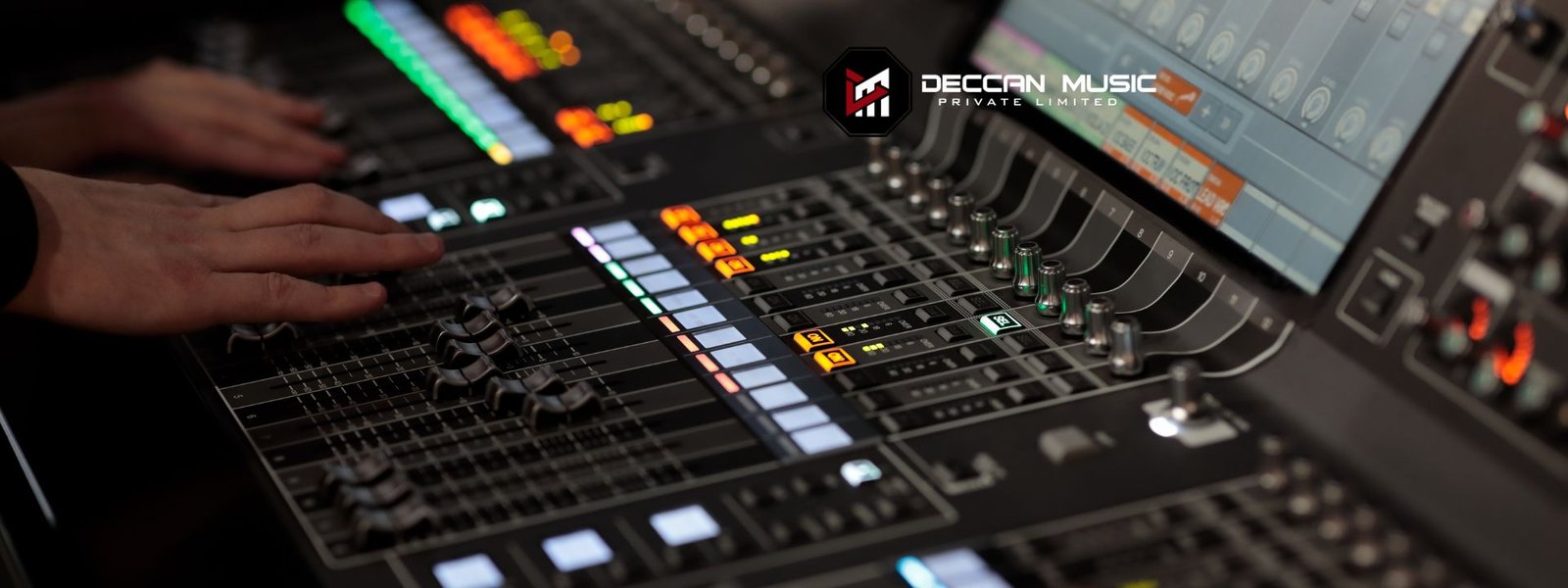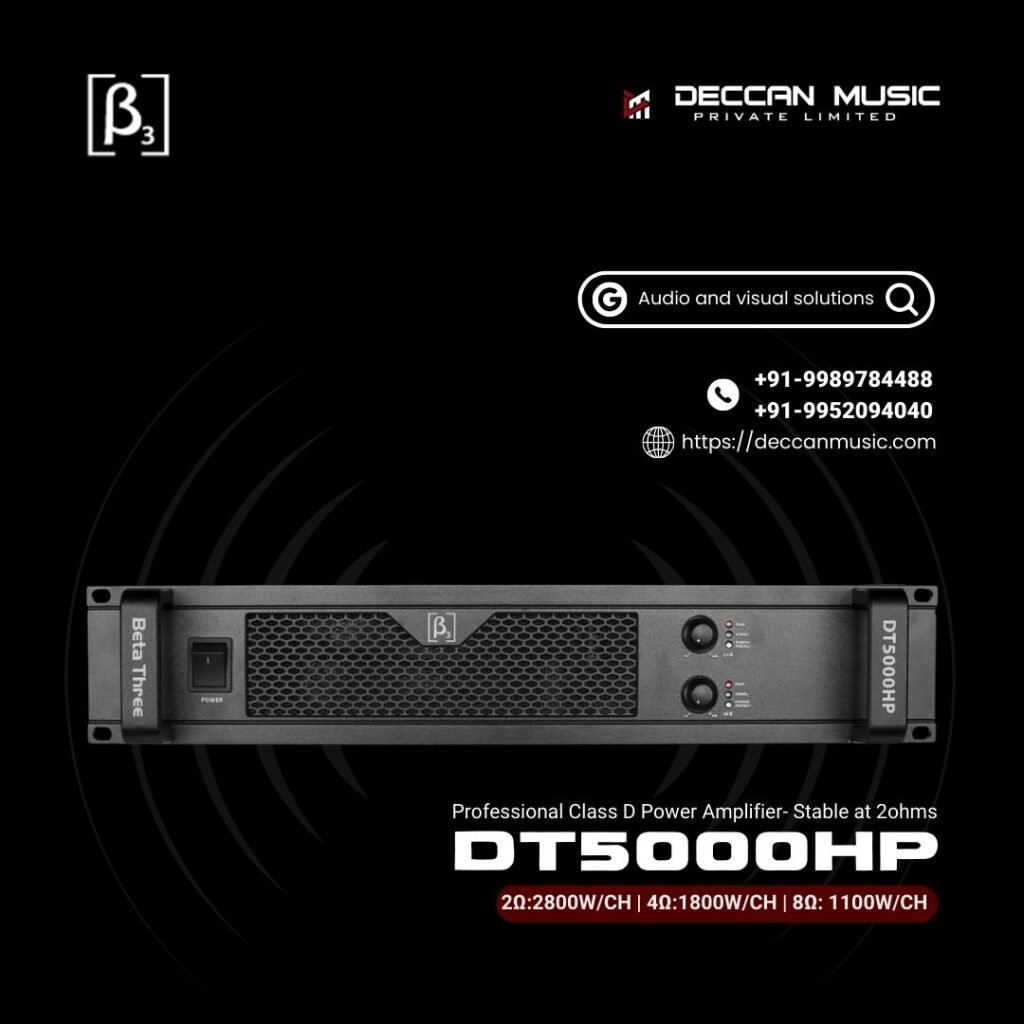Choosing between an Analog and Digital Console
By:- Deccan Music: Best DJ Equipment Supplier
In the world of music production, the choice between an analog and digital console is a critical decision that can greatly impact the outcome of your musical endeavors. Both analog and digital consoles have their unique characteristics, benefits, and limitations. Understanding these differences will help you make an informed decision that aligns with your specific needs and preferences. In this article, we will delve into the details of analog and digital consoles, explore their features, and discuss the factors to consider when making a choice.
Understanding Analog Consoles with Deccan Music: Best DJ Equipment Supplier.
An analog console, also known as a mixing desk or mixing board, is a traditional piece of audio equipment that operates using analog circuitry. It consists of physical knobs, faders, and switches that manipulate audio signals. Analog consoles have been the industry standard for many years and are revered for their warm and organic sound reproduction. The audio signals in an analog console travel through physical pathways, providing a tactile and hands-on experience for the operator.
What is an analog console?
An analog console is a musical instrument that allows engineers and producers to mix multiple audio signals together. It consists of various channels, each equipped with controls for adjusting volume, equalization, panning, and other audio parameters. The signals are routed through the console, processed, and sent to the desired outputs.
Benefits of analog consoles
Analog consoles offer several advantages that make them appealing to many music professionals. Firstly, analog consoles are renowned for their sonic characteristics. They impart a unique warmth and richness to the audio signals, often referred to as the “analog sound.” This characteristic is particularly desirable in certain genres, such as rock and jazz, where a vintage and organic sound is preferred.
Additionally, analog consoles provide a hands-on and intuitive mixing experience. The physical knobs and faders offer precise control over the audio parameters, allowing engineers to fine-tune the sound to their liking. The tactile nature of analog consoles enables a deeper connection with the music and can inspire creativity during the mixing process.
Limitations of analog consoles
Despite their undeniable charm, analog consoles have a few limitations to consider. Firstly, analog consoles tend to be larger and heavier compared to their digital counterparts. This can pose challenges in terms of portability and space requirements, especially for musicians who frequently travel or have limited studio space.
Another limitation is the lack of recallability. Once you set the knobs and faders on an analog console for a specific mix, it can be challenging to replicate the exact settings in the future. This can be a hindrance if you work on projects that require consistent recall of specific mix settings.
Exploring Digital Consoles
Digital consoles have gained significant popularity in recent years due to advancements in technology. Unlike analog consoles, digital consoles process audio signals using digital algorithms and software. They provide a vast array of features and functionalities that can greatly enhance the mixing and recording process.
What is a digital console?
A digital console is a sophisticated piece of equipment that uses digital signal processing (DSP) to manipulate audio signals. It replaces physical knobs and faders with a digital interface, often in the form of a touchscreen or a computer-based software application. Digital consoles offer extensive routing options, signal processing capabilities, and the ability to store and recall settings with ease.
Advantages of digital consoles
Digital consoles offer numerous advantages that have made them increasingly popular in the music industry. One of the key benefits is the flexibility and versatility they provide. With a digital console, you have access to a wide range of built-in effects, equalizers, compressors, and other signal processing tools. These tools can be applied to individual channels or the entire mix, allowing for precise control over the sound.
Another advantage of digital consoles is their compactness and portability. Unlike analog consoles, which can take up a significant amount of space, digital consoles are often more compact and lightweight. This makes them suitable for small studios or live performances where space is limited.
Drawbacks of digital consoles
While digital consoles offer many advantages, they also come with a few drawbacks. One common concern is the learning curve associated with operating digital consoles. The extensive features and complex menu systems can be overwhelming for beginners, requiring a significant amount of time and effort to become proficient.
Another consideration is the reliance on technology. Digital consoles rely on software and firmware, which can occasionally be prone to glitches or compatibility issues. This means that regular updates and maintenance are necessary to ensure the console operates optimally.
Factors to consider when choosing between analog and digital consoles
When it comes to choosing between analog and digital consoles, several factors should be taken into account. Here are some key considerations:
Sound quality
Analog consoles are revered for their warm and organic sound, while digital consoles offer pristine audio quality and the ability to manipulate sound in greater detail. Consider the sonic characteristics that align with your musical style and preferences.
Flexibility and versatility
Digital consoles provide extensive routing options and a wide range of built-in effects, making them highly flexible and versatile. Analog consoles, on the other hand, offer a more straightforward and hands-on mixing experience. Think about the level of control and flexibility you require for your projects.
Cost and budget
Analog consoles are generally more expensive than digital consoles due to the intricate analog circuitry and physical components involved. Digital consoles, particularly software-based ones, often provide more cost-effective options. Evaluate your budget and consider the long-term investment and potential scalability of your setup.
Learning curve
Digital consoles can have a steeper learning curve compared to analog consoles. Consider your level of expertise and the amount of time you are willing to invest in learning the intricacies of a digital console.
Maintenance and longevity
Analog consoles are known for their durability and longevity, requiring minimal maintenance compared to digital consoles. Digital consoles, being reliant on technology, may require regular updates and maintenance to ensure optimal performance. Consider the long-term maintenance and lifespan of the console.
Making the decision
Choosing between an analog and digital console ultimately depends on your specific requirements and preferences. If you prioritize a vintage, hands-on experience with a distinct analog sound, an analog console may be the ideal choice. On the other hand, if you value flexibility, extensive features, and pristine audio quality, a digital console may better suit your needs.
It’s important to thoroughly research and test different consoles before making a decision. Consider reaching out to professionals in the industry, visiting music gear expos, or seeking advice from experienced engineers to gain insights into the best console for your specific use case.






